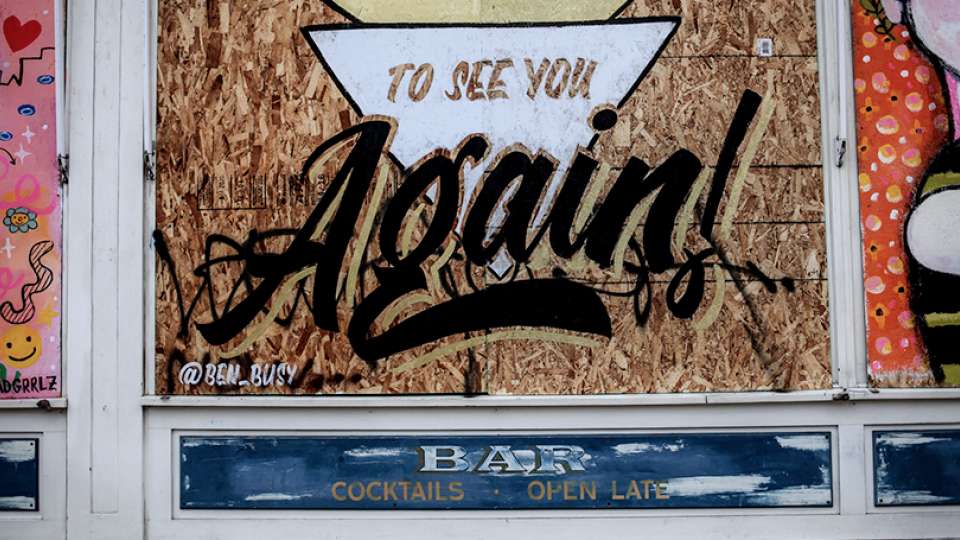5 Ways to Safely Support Small Businesses During COVID-19

The holidays are just around the corner. But this year, shopping for presents, gathering at restaurants and partaking in other festive activities that support our economy pose a risk for spreading COVID-19.
How can we shop local without putting ourselves and others at risk of catching the virus? Elizabeth Umphress, professor of management at the University of Washington’s Foster School of Business, gives five tips for how to safely support our small businesses during the pandemic.
Do your research
Before deciding where to purchase products, produce, presents — you name it — look into small businesses that you want to see through to the other side of the pandemic. Why?
“Small businesses tend to be the ones that are living month to month,” says Umphress. “Maybe they have a six-month cash flow that they can cover, but after that, not so much. It’s up to individual consumers making a conscious choice of the businesses they want to see when the pandemic is over.”
In other words, supporting your favorite local plant shop, ice cream parlor or hardware store will have a far greater impact on their ability to make it through the pandemic compared to a big retailer.
“Do research on the businesses you want to see succeed and don’t just blindly go to one retail shop to find what you’re looking for,” says Umphress. “Be more mindful about helping small businesses in your community and make an effort to support businesses owned by marginalized groups, including women- and minority-owned businesses.”
When you’re studying up on the small businesses you want to support, Umphress also recommends making sure the company is not owned by a larger corporation.
Opt for contactless pickup and delivery
Since the start of the pandemic, businesses have pivoted to offer contactless pickup and delivery options.
Instead of in-person shopping, order online for mail or drop-off delivery. If delivery isn’t an option, choose to pick up your order to spend minimal time in-store.
If a business doesn’t have their products listed online, call ahead to confirm they’re in stock and ask them to set your items aside or pre-order, so you can quickly complete your purchase.
Umphress notes that delivery and pickup options aren’t limited to just groceries and restaurants. From bookstores to clothing retailers, businesses of all kinds are offering contactless ways to buy their products.
If your favorite neighborhood gym or yoga studio has remained closed during the pandemic, you can show your support by buying gift cards to redeem when they re-open. Some local fitness studios have even started offering online classes — a safe way to stay active at home.
While eating takeout in your kitchen or doing a HIIT workout in your living room might not feel as thrilling as in-person experiences, they’re the new norm — and a safe way to support local.
“We’re in a pandemic, it’s not business as usual,” says Umphress.
Share on social media
Another way to support small businesses in your community is to spread the word on social media.
“You can help advertise for your community,” says Umphress. “Share links of your favorite small businesses on your social media and encourage others to shop there.”
The simple act of sharing a link on your Instagram story or Facebook post can have a big impact on that small business down the street.
“Larger organizations have the assets to market better during these crises, whereas small business owners are just trying to support their workers and themselves and pay rent. They don’t always have the cash to put into marketing,” explains Umphress. “What we do right now matters a lot, and these small actions add up.”
Don’t hoard
Remember the rush to stock up on toilet paper in the beginning of the pandemic? Or the second wave of bare shelves in the supermarket when Gov. Inslee announced new statewide restrictions in November?
That hoarding behavior hurts our economy.
“Hoarding is a psychological phenomenon where if you perceive something as scarce you want it more, but it’s a false perception. When hoarding happens, we disrupt the supply chain, and it starts creating unneeded stress on supplies,” explains Umphress.
Take what you need, but don’t go overboard. The Washington Food Industry Association, which created a list of tips for shoppers during COVID-19, has reassured that there are enough supplies to go around and that there is no reason to panic buy.
Shop with mindfulness
When you think of where you spend your money during the pandemic, be it on groceries or gifts, think of how it can help shape our post-pandemic future.
“I think about what I’d like this environment to look like when my children are older,” says Umphress.
Can’t picture mornings without your favorite neighborhood coffee shop? Looking forward to wandering the shelves of the bookstore down the street again? Support them now so you — and the entire community — can enjoy them in the future.
“When we bring a community mindset to these types of social issues — when we think of ourselves as not just one family, but as a social unit — it helps us make smarter decisions as far as our purchasing,” says Umphress. “If we could all be more mindful about those choices, then we can help keep our community safer and help our businesses survive.”
The info in this article is accurate as of the publishing date. While Right as Rain strives to keep our stories as current as possible, the COVID-19 pandemic continues to evolve. It’s possible some things have changed since publication. We encourage you to stay informed by checking out your local health department resources, like Public Health Seattle King County or Washington State Department of Health.

 Healthy ideas for your inbox
Healthy ideas for your inbox





